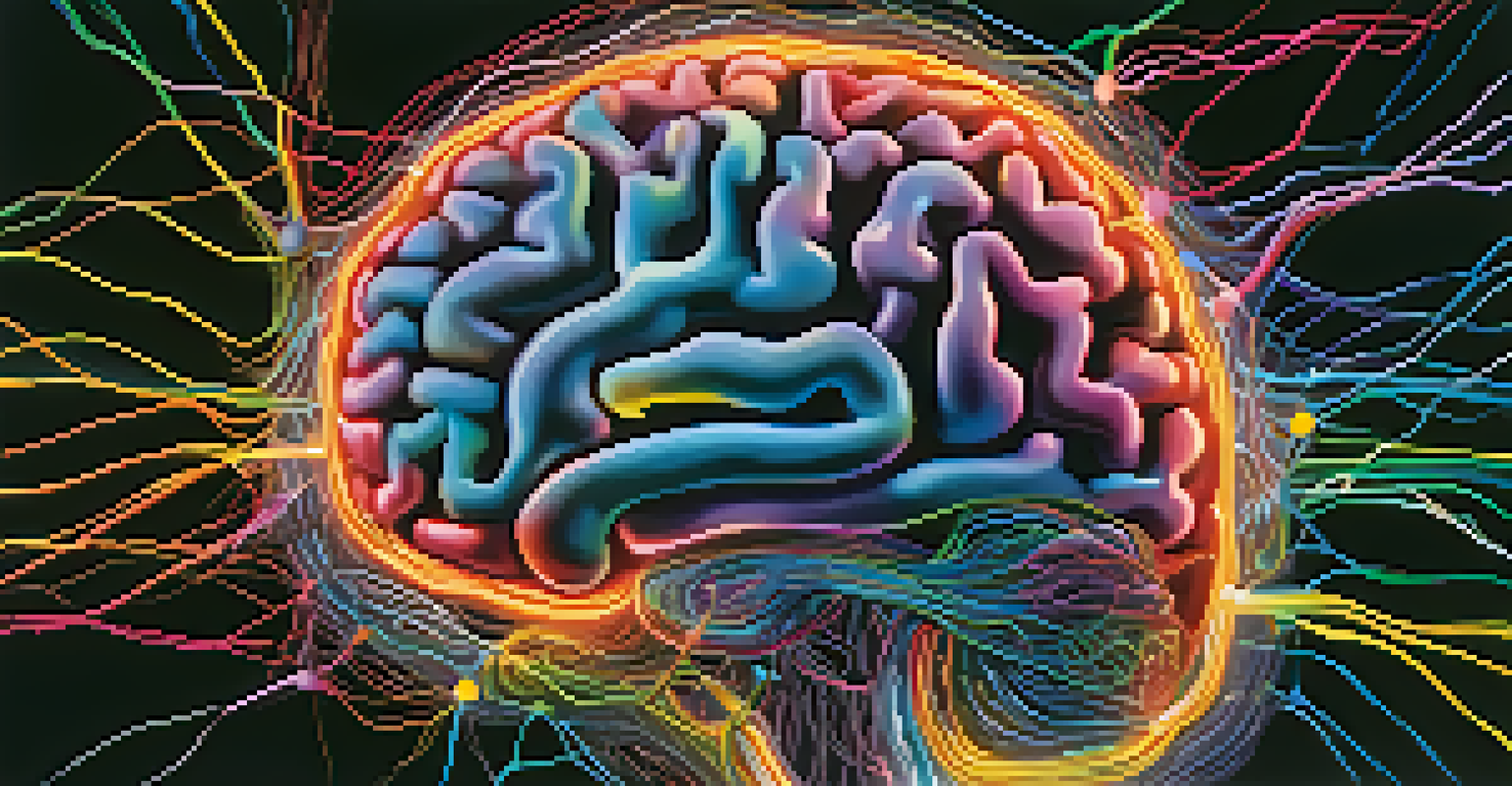Current Trends in Hallucinogen Research: A 21st Century Perspective

Rise of Psychedelics in Mental Health Treatment
In recent years, there has been a resurgence of interest in hallucinogens for mental health treatment. Drugs like psilocybin and MDMA are being studied for their potential to alleviate conditions such as depression, PTSD, and anxiety. This trend marks a significant shift from the stigma of the past to a more scientific approach that embraces the therapeutic benefits of these substances.
Psychedelics are not a panacea, but they may provide a valuable tool in the mental health toolbox.
Clinical trials are showing promising results, with participants reporting profound insights and emotional breakthroughs. For instance, studies have demonstrated that psilocybin can lead to lasting changes in mood and perspective after just a few sessions. This has sparked a wave of enthusiasm among researchers and clinicians eager to explore the full potential of these compounds.
As we move forward, the integration of psychedelics into mainstream mental health treatment is becoming more feasible. However, it is essential to ensure that these substances are administered in controlled settings to maximize their benefits and minimize risks. The conversation around psychedelics is evolving, paving the way for a new understanding of mental health care.
The Role of Neuroscience in Understanding Hallucinogens
Neuroscience is playing a critical role in unraveling how hallucinogens affect the brain. Researchers are using advanced imaging techniques to observe the brain's activity during psychedelic experiences. This allows scientists to see how these substances alter neural pathways and emotional responses, providing valuable insights into their effects.

One key finding is that hallucinogens can promote neuroplasticity, which is the brain's ability to reorganize itself by forming new connections. This could explain why individuals often report lasting changes in thinking and behavior after psychedelic use. By understanding these mechanisms, researchers hope to develop targeted therapies that harness the power of psychedelics for beneficial outcomes.
Psychedelics Gain Acceptance in Therapy
Hallucinogens like psilocybin and MDMA are increasingly recognized for their potential to treat mental health conditions, shifting public perception from stigma to scientific exploration.
Furthermore, the exploration of brain connectivity during altered states of consciousness is revealing fascinating correlations between psychedelics and creativity or problem-solving. As we deepen our understanding of these neural processes, we may unlock new avenues for treating mental health disorders and enhancing cognitive function.
Cultural Shifts in Perceptions of Psychedelics
Cultural attitudes towards hallucinogens are changing dramatically in the 21st century. Once viewed solely as dangerous drugs, substances like LSD and ketamine are now being recognized for their potential therapeutic effects. This shift is partly influenced by a growing body of scientific research that supports their use in mental health treatment.
The mind is a well of creativity; psychedelics can help us dip our buckets in to see what we can pull out.
Documentaries, books, and podcasts highlighting personal stories of healing through psychedelics have contributed to this cultural renaissance. As more people share their positive experiences, the stigma surrounding these substances diminishes. This newfound openness is encouraging a broader dialogue about the responsible use of psychedelics in society.
Additionally, legalization efforts in various regions are paving the way for regulated therapeutic use. This cultural evolution not only reflects a more informed perspective on psychedelics but also signifies a broader acceptance of alternative approaches to mental wellness.
Ethical Considerations in Hallucinogen Research
As hallucinogen research expands, ethical considerations are coming to the forefront. Researchers must navigate the complexities of informed consent, especially when dealing with substances that can alter perception and cognition. Ensuring participants understand the risks and benefits of their involvement is paramount to maintaining ethical standards.
Moreover, the potential for misuse or recreational use of hallucinogens raises concerns about the integrity of research. Striking a balance between exploration and caution is essential to prevent the co-opting of scientific findings for non-therapeutic purposes. This includes establishing clear guidelines for the responsible use of psychedelics in both research and clinical settings.
Neuroscience Reveals Brain Changes
Research demonstrates that psychedelics can promote neuroplasticity, leading to lasting changes in mood and behavior, which opens new avenues for mental health treatments.
Finally, as we witness the emergence of commercial interests in psychedelics, the need for regulation becomes even more critical. Ensuring equitable access to these treatments while safeguarding community health is a challenge that researchers and policymakers must address together.
Psychedelics and Their Impact on Creativity
The connection between psychedelics and creativity has fascinated artists and scientists alike for decades. Many individuals report experiencing heightened creativity and new perspectives during and after psychedelic experiences. This phenomenon has prompted researchers to delve deeper into how these substances can enhance creative thinking.
Studies suggest that psychedelics may facilitate divergent thinking, a cognitive process that involves generating multiple solutions to a problem. This can lead to innovative ideas and breakthroughs in various fields, from art to science. The ability to think outside the box is not only appealing but could also drive advancements across multiple disciplines.
As the creative community continues to explore the potential benefits of psychedelics, it raises questions about the future of creativity in a society increasingly influenced by technology. Will psychedelics become a tool for artists and innovators seeking inspiration? Only time will tell as research continues to unfold.
Current Legal Landscape of Hallucinogens
The legal status of hallucinogens is rapidly evolving, with various jurisdictions re-evaluating their regulations. In some regions, substances like psilocybin and MDMA are being decriminalized or even legalized for therapeutic use. This shift reflects a growing recognition of the potential benefits these substances offer while addressing previous concerns about safety and abuse.
For example, cities like Denver and Oakland have taken steps to decriminalize psilocybin mushrooms, allowing for a more open exploration of their effects. Such movements are gaining traction as public support for psychedelic research grows, leading to increased pressure on lawmakers to consider changes in legislation.
Legal Landscape of Psychedelics Shifts
The evolving legal status of hallucinogens, with movements toward decriminalization and therapeutic use, reflects a growing recognition of their benefits and the need for regulation.
However, despite these advancements, the legal landscape remains complex and inconsistent across different areas. Understanding the implications of these changes is crucial for both researchers and potential users, as they navigate the new terrain of psychedelic legality.
Future Directions in Hallucinogen Research
Looking ahead, the future of hallucinogen research is filled with promise and potential. As scientific inquiry expands, we can expect a deeper understanding of how these substances interact with the brain and their therapeutic applications. The ongoing collaboration between researchers, clinicians, and policymakers will be vital in shaping the next steps for this field.
Emerging technologies, such as virtual reality and artificial intelligence, may also play a role in enhancing the research process. These tools can provide immersive environments for studying the effects of psychedelics and help to tailor therapeutic approaches for individuals. By combining innovative methodologies with traditional research practices, we may unlock new possibilities.

Ultimately, the goal is to establish a comprehensive framework for integrating psychedelics into mental health treatment. This includes ensuring accessibility, safety, and ethical considerations are prioritized. As we embrace the future of hallucinogen research, we are not just exploring substances but also embarking on a journey toward understanding the complexities of the human mind.